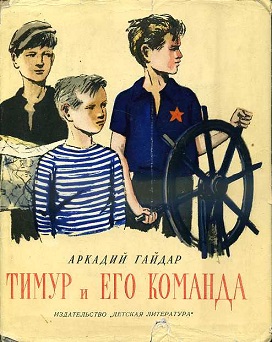Timur and His Squad facts for kids

First edition
|
|
| Author | Arkady Gaidar |
|---|---|
| Original title | Тимур и его команда |
| Country | USSR |
| Language | Russian |
| Genre | Children's literature |
| Publisher | Detskaya Literatura, Moscow |
|
Publication date
|
1940 |
| Media type | |
| ISBN | 978-5-353-06022-2 |
Timur and His Squad (Timur I yevo komanda, Тимур и его команда) is a popular short novel. It was written by Arkady Gaidar and first published in 1940. The book tells the story of a group of village kids. They secretly do good deeds for others. They help families whose fathers and husbands are away fighting in the Red Army (the army of the Soviet Union). The kids also battle against mean bullies.
This book had a huge impact on young people in the Soviet Union. A movement called the Timurite movement (Timurovtsy) began. Thousands of children across the country joined in. They did good deeds just like Timur's squad. Timur and His Squad was even part of the school lessons in the Soviet Union until the 1990s.
The short novel was also made into two movies. The first was Timur and His Team (1940) by Aleksandr Razumny. The second was Timur and His Team (1976) by Aleksandr Blank and Sergei Linkov.
Contents
How the Idea Started
The story of Timur and His Squad grew over many years. It was inspired by Arkady Gaidar's own experiences. He often organized groups of children to help others.
Gaidar's Real-Life Squad
One time, Gaidar's friend Konstantin Paustovsky had a very sick son. The boy needed a rare medicine quickly. Gaidar was staying at Paustovsky's house. He made a phone call and gathered some boys from his house and nearby. He sent this group all over the city to find the medicine. They delivered it in about 40 minutes!
Paustovsky later wrote about it. Gaidar asked him, "See, how well does my squad work?" Gaidar didn't like being thanked. He believed helping people was as normal as saying hello.
Why Play Good Guys?
Author Ruvim Frayerman remembered a conversation with Gaidar. Gaidar once asked him: "Why do you think boys have always played outlaws?" Outlaws are usually bad guys. But Gaidar thought children were smart. He believed playing outlaws was a way for kids to act out the idea of freedom.
Gaidar felt that Soviet children lived in a new time. They wouldn't play outlaws fighting kings anymore. Instead, they would play games that helped their country. They would help Soviet soldiers fight against "international outlaws." This idea led to the story of Timur's good gang.
What the Story Is About
The story begins when Zhenya (13) and her older sister Olga (18) arrive at their dacha (a country house) from Moscow. They notice strange things happening at night.
Timur's Secret Group
Zhenya soon discovers a secret clubhouse in an old barn. It belongs to a mysterious group. She meets Timur, the leader of this group. Timur's Squad is made up of many well-organized boys. They secretly do good deeds for people.
They help families of army officers and soldiers. They also support older people and younger children. And they fight against a gang of bullies led by a boy named Kvakin.
Misunderstandings and Trust
Timur's secret "games" make some people suspicious. Timur's uncle, Georgy, is one of them. Georgy asks Timur what kind of games he plays. Georgy says when he was young, they just ran and jumped. He thinks Timur's games are too complicated.
Olga sees Timur talking to Kvakin. She mistakenly thinks Timur is part of the bully gang. But Zhenya knows the truth. She starts to admire Timur. She sees him as an honest, brave, and humble leader.
The Big Battle and Helping Hand
There is a big fight between Timur's squad and Kvakin's gang. Timur and his boys win!
Later, Timur helps Zhenya in a very important way. He helps her meet her father before he goes off to war. Georgy, Timur's uncle, also goes to war. Olga, who is now friends with Georgy, finally understands Timur. She tells him, "You live for other people, and people will respond in a kind way."
 | Calvin Brent |
 | Walter T. Bailey |
 | Martha Cassell Thompson |
 | Alberta Jeannette Cassell |

